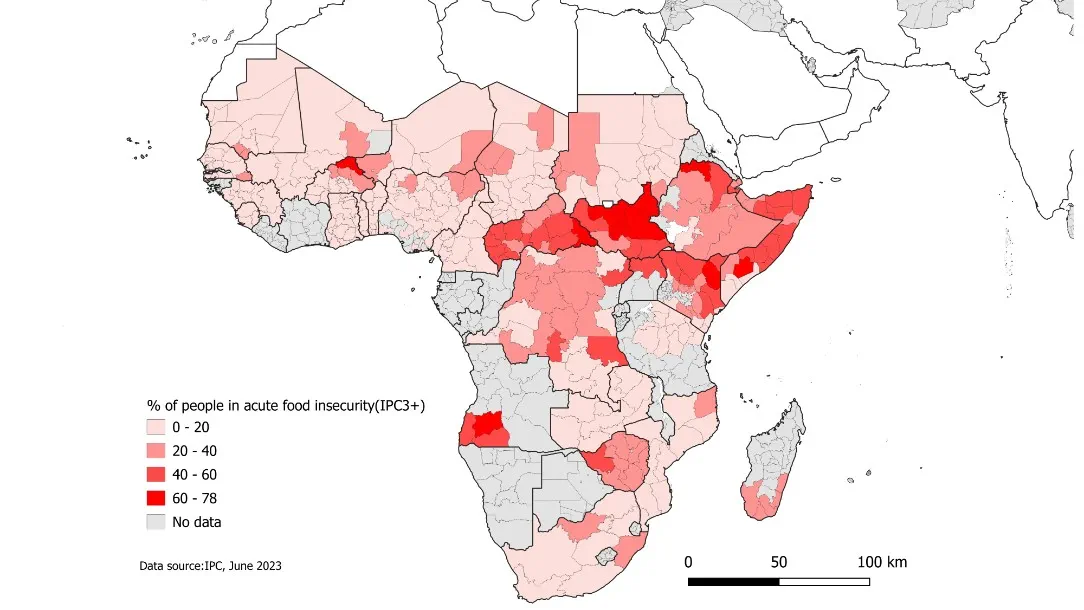The far-reaching impacts of the Ukraine conflict, 500 days on
The escalation of conflict in Ukraine has had a devastating impact on the country. But 500 days on from the escalation of violence, we are seeing a ripple effect that reaches across the globe
In the 500 days since the escalation of conflict in Ukraine, life has become unrecognisable for millions of people inside and outside of the country. Economic ripple effects have also impacted lives and livelihoods across the globe.
Since February 2022, more than 7.8 million people have fled Ukraine, more than 6.5 million have been internally displaced, and more than 17 million people in the country need humanitarian support.
The British Red Cross launched its Ukraine Crisis Appeal in the days after the conflict’s escalation in late February 2022. Since then, the Red Cross Red Crescent Movement has reached over 16.9 million people with assistance including food, clothing, hygiene items and medicine.
Skyrocketing global food prices contributing to a crisis
The conflict’s impacts have, however, been felt much further afield, particularly in parts of Africa, where a deadly food crisis was already unfolding.
Following the conflict’s escalation, global food, fuel and fertiliser prices skyrocketed. These prices had already been on the increase, in part due to supply chain disruptions linked to the Covid-19 pandemic, but further soared in February last year. Now, 500 days on, the prices remain considerably higher than they were three years ago.
Difficulty exporting grains from Ukraine and Russia, uncertainty about future harvests in both countries, and increased cost of fuel to transport goods, have each contributed to the problem.
The recent destruction of the Kakhovka Dam in Ukraine has also raised serious concern among agencies like the Food and Agriculture Organization of the United Nations, which warns that extensive flooding across the Kherson region poses severe threats to agricultural systems.
But while the factors behind the price increases are numerous and complex, one thing is for sure: they are having a devastating impact on the lives of millions.

A map highlighting the percentage of people living in acute food insecurity across parts of Africa. SOURCE: IFRC and IPC
Over 140 million people struggling to eat
The impact of inflation is being felt particularly hard in many countries in Africa, where high prices are compounding a food crisis in countries including Ethiopia, Nigeria, Somalia, and Kenya.
Today, over 140 million people in parts of Africa are food insecure, meaning they are struggling to have enough food for themselves and their loved ones.
Areas that remain largely dependent on food imports to feed their populations are especially badly affected. Before the conflict, the East Africa region obtained 90 per cent of its wheat imports from Russia and Ukraine.
A number of countries in Africa – including Somalia, Ethiopia, South Sudan, Mali, Burkina Faso, Nigeria, Chad and Niger – are also disproportionately affected by climate change. As a result, they are especially vulnerable to volatile food prices, tending to have more fragile food systems that are less able to adapt to changes. Severe droughts and floods, made much more likely due to climate change, also make it harder for farmers to harvest food.
The knock-on effects of food insecurity are, in themselves, wide-ranging. People may be forced to sell livestock, take children out of school, and cut back on essentials like healthcare in order to cope. Even a child who is sick with malaria may not receive the medical attention they need in order to ensure the child’s household has enough food.

A volunteer from the Kenya Red Cross gives a child plumpy'nut, a nut-based paste used as treatment for malnutrition, at a malnutrition clinic in Turkana, Kenya. PHOTO: Esther Mbabazi/British Red Cross
A solution to the food crisis
Some of the most resilient and resourceful people in the world are being pushed to breaking point. But there is hope.
In the same way that Red Cross teams are supporting those affected by the conflict in Ukraine, they are also on the ground working hand in hand with local authorities and local people, helping communities hit the hardest by food insecurity around the world.
Whether providing short-term solutions like vital food supplies and healthcare, or supporting longer-term initiatives like working with farmers to future-proof their farming techniques, local Red Cross teams are at the heart of the response to the food crisis in parts of Africa.
There is no quick-fix to the food crisis, but there are things we can all do to help.
You can learn more about the Red Cross’s response to the food crisis here, and donate to the Africa Food Crisis appeal here.
Together, with your support, we are the world’s emergency responders.
This is urgent. Please help us continue our work.
Your donation to the Africa Food Crisis Appeal will help us to reach more people with vital help
DONATE NOW